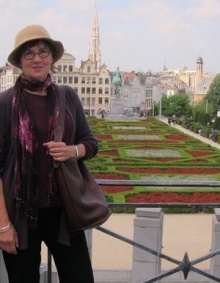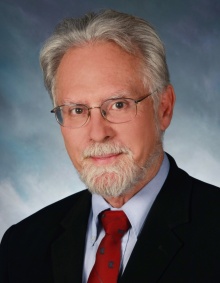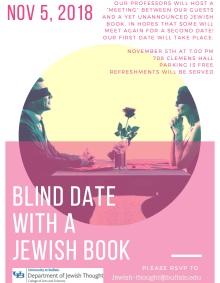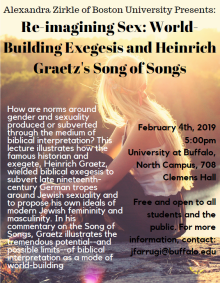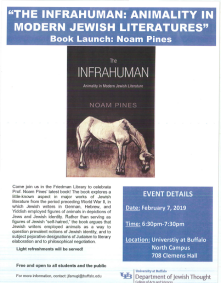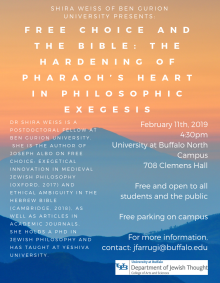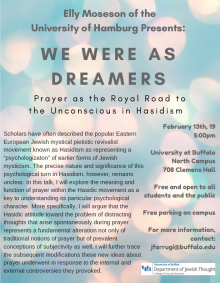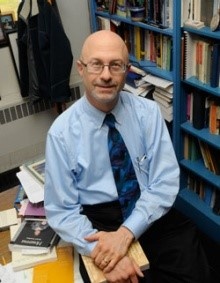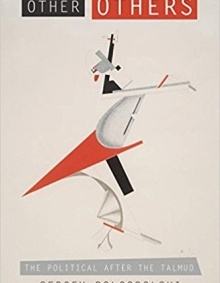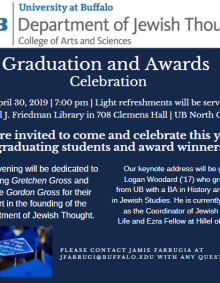2018-19 Events
Join our mailing list to receive regular updates on departmental news and events!
“What is Time? A Medieval Debate between Jewish and Islamic Philosophers” Lecture by Professor Tamar Rudavski
Date October. 11, 2018
Time 2:00pm
Location:
University at Buffalo, North Campus, Baldy 200G
Professor Tamar Rudavsky is the Director at the Melton Center for Jewish Studies at Ohio State University. She is co-editor with Steven Nadler of the Cambridge History of Jewish Philosophy: From Antiquity through the Seventeenth Century (2009) and author of Time Matters: Time, Creation and Cosmology in Medieval Jewish Philosophy (2000). Her newest book, Jewish Philosophy in the Middle Ages: Science, Rationalism and Religion, is forthcoming with Oxford University Press.
On October 12th, 2018, Rudavsky began her argument with a contrast between an Aristotelian conception of time in which things exist in time defined by objective motion, and an occasionalist notion of time that contests temporal unity based on continuous patterns of observation and supposes instead the existence of discrete time atoms created individually by God. Rudavsky takes the Jewish philosopher Moses Maimonides (1135-1204) as her representative for the former, and the Islamic Kalam thinker al-Ghazali (1058-1111) for the latter. A third figure makes up the philosophical network which Rudavsky’s lecture sought to illuminate: Edmund Husserl (1859-1938), whom Rudavsky argued is conceptually linked to al-Ghazali.
Professor David Patterson Hosted Two Events
Lecture: “The Singularity of the Holocaust”
Book presentation: “The Holocaust and the Non-representable: Literary and Photographic Transcendence”
Lecture Details:
Date: Oct. 22, 2018
Time: 7:30pm – 9:30pm
Book Presentation Details:
Date: Oct. 23, 2018
Time: 12:15pm – 1:50pm
Location for Both Events
University at Buffalo, North Campus,
120 Clemens Hall
Professor David Patterson holds the Hillel A. Feinberg Chair in Holocaust Studies, Ackerman Center for Holocaust Studies, at the University of Texas at Dallas. A winner of the National Jewish Book Award, the Koret Jewish Book Award, and the Holocaust Scholars’ Eternal Flame Award, he has published more than 35 books and more than 200 articles, essays, and book chapters on topics in literature, philosophy, the Holocaust, and Jewish studies. His most recent books include Portraits: Elie Wiesel’s Hasidic Legacy (forthcoming), The Holocaust and the Non-Representable (2018), Anti-Semitism and Its Metaphysical Origins (2015), Genocide in Jewish Thought (2012), and A Genealogy of Evil: Anti-Semitism from Nazism to Islamic Jihad (2010).
Professor David Patterson's two talks on the Holocaust were both very well attended, about fifty people at each lecture, and, if the question period afterward is any indication, very well received. The audience was made up of students, professors and local community people. On Monday, October 22, 2018 Patterson spoke about "The Singularity of the Holocaust." Though the Holocaust is indeed "singular," because the Nazi's were attempting the metaphysical task of eliminating morality, in the person of the Jews and Judaism, from the face of the earth, it is for that very reason of universal significance, showing the darkest side of all forms of anti-humanism. On Tuesday, October 23, 2018 Patterson shed light on the topic of his latest book, namely, the impossibility of representing - in literature or film - the negative essence, the murderous intent, of the Holocaust in its anti-human ferocity.
Blind Date With a Jewish Book Incites a Second Date!”
Vasily Grossman’s book “Life and Fate”
Date: November 5, 2018
Time: 7:00pm
Location: Samuel Friedman Library, 708 Clemens Hall
On a Monday night in early November 2018, the Department of Jewish Thought at SUNY Buffalo hosted an enthusiastic group of undergraduate and graduate students, members of the community, and faculty to present its first iteration of “Blind Date With a Jewish Book.” Richard Cohen presented “Life and Fate” by Vasily Grossman. Richard Cohen opened his remarks with the adage, “when a book is good, it’s not long enough; when it is bad, it’s too long.” For Cohen, Life & Fate is clearly not long enough. For as everyone knows who has ever been sucked in by a novel, great literature is transcendent: it breaks boundaries and expands horizons. The reader is taken outside of himself and experiences other consciences, other worlds. “If you want to know what it is like to live in a totalitarian state,” said Cohen, “then read this book. The presentation was followed by a lively discussion touching on antisemitism, totalitarianism, Soviet history, and the importance of great literature.
"Re-imagining Sex: World-Building Exegesis and Heinrich Graetz's Song of Songs" Lecture by Professor Alexandra Zirkle
Date: February 4, 2019
Time: 5:00pm
Location: Samuel Friedman Library, 708 Clemens Hall
Dr. Alexandra Zirkle researches and teaches in the fields of modern Jewish thought, the politics of biblical hermeneutics, and Jewish-Christian relations. Her manuscript, "Biblical Interpretation and the Formations of Modern German Jewry," traces how nineteenth-century German Jewish exegetes drew upon biblical hermeneutics to craft emancipatory models of Jewish subjectivity during an era of widespread political oppression. Dr. Zirkle is currently a Postdoctoral Fellow at the Elie Wiesel Center for Jewish Studies at Boston University and has held research and teaching positions at the University of Notre Dame, the Leibniz Institute of European History, Hebrew Union College-Jewish Institute of Religion in Los Angeles, and the University of Chicago. She received her PhD with distinction from the University of Chicago Divinity School.
The Lecture questioned how are norms around gender and sexuality produced or subverted through the medium of biblical interpretation. This lecture illustrates how the famous historian and exegete, Heinrich Graetz, wielded biblical exegesis to subvert late nineteenth-century German tropes around Jewish sexuality and to propose his own ideals of modern Jewish femininity and masculinity. In his commentary on the Song of Songs, Graetz illustrates the tremendous potential--and possible limits--of biblical interpretation as a mode of world-building.
Professor Noams Pines "The Infrahuman: Animalities in Modern Jewish Literature"
Book Launch
Date: February 7, 2019
Time: 6:30pm
Location: Samuel Friedman Library, 708 Clemens Hall
Professor Sergey Dolgopolski's new book! "The Other Others" puts contemporary political theory and a literary-theoretical exploration of the core text of Rabbinic Judaism, the Talmud, into both a fruitful and tensed conversation one with another. In the words of the book's catalogue description: "Denying legal and moral existence to those who do not belong to a land, while tolerating diversity of those who do stabilizes a political order—or does it? Revisiting this core problem of contemporary political theory, Other Others turns to the Talmud as an untapped resource for a conception of the political and a take on excluded others our philosophical and theological traditions have effaced."
"Free Choice and the Bible: The Hardening of Pharaoh's Heart in Philosophical Exegesis" Lecture by Professor Shira Weiss
Date: February 11, 2019
Time: 4:30pm
Location: Samuel Friedman Library, 708 Clemens Hall
Dr Shira Weiss is a postdoctoral fellow at Ben Gurion University. She is the author of Joseph Albo on Free Choice: Exegetical Innovation in Medieval Jewish Philosophy (Oxford, 2017) and Ethical Ambiguity in the Hebrew Bible (Cambridge, 2018), as well as articles in academic journals. She holds a PhD in Jewish Philosophy and has taught at Yeshiva University.
Dr. Weiss began her lecture by laying out three varying positions that biblical exegetes have generally taken concerning the issue of free will. First, there are those who assert the liberty of human free choice and responsibility for their actions. Second are those who deny free choice and instead assign agency to some other cause such as biological or theological determinism. Yet in the third case we have a compatibilist’s take on the topic: free will and determinism are not mutually exclusive. Taking the classic biblical example of the Egyptian Pharaoh’s refusal to free the Jews and the refrain that states God “hardened his heart,” Dr. Weiss outlined the views of two medieval Jewish philosophers who wrote about this biblical event in particular and free will more generally.
"We Were As Dreamers: Prayer as the Royal Road to the Unconscious in Hasidism" Lecture by Professor Chaim Elly Moseson
Date: February 13, 2019
Time: 5:00pm
Location: Samuel Friedman Library, 708 Clemens Hall
Dr. Chaim Elly Moseson is Postdoctoral Research Fellow, Institute of Jewish Philosophy and Religion at th Universität Hamburg. Dr. Moseson's areas of research cover early modern Jewish movements and literatures, cultural and political functions of texts, intersection of literature, psychoanalysis and religion, and Yiddish Musar literature.
HamburgScholars have often described the popular Eastern European Jewish mystical pietistic revivalist movement known as Hasidism as representing a “psychologizaton” of earlier forms of Jewish mysticism. The precise nature and significance of this psychological turn in Hasidism, however, remains unclear. In this talk, Professor Moseson explored the meaning and function of prayer within the Hasidic movement as a key to understanding its particular psychological character. He argued that the Hasidic attitude toward the problem of distracting thoughts that arise spontaneously during prayer represents a fundamental alteration not only of traditional notions of prayer but of prevalent conceptions of subjectivity as well. Professor Moseson was able to trace the subsequent modifications these new ideas about prayer underwent in response to the internal and external controversies they provoked.
Blind Date With a Jewish Book: Second Edition With a Yizkor Book?
Guest Presenter: Dr. Theodore Steinberg
Date: March 5, 2019
Time: 7:00pm
Location: Samuel Friedman Library, 708 Clemens Hall
Our second blind date with a Jewish book took place on March 5, 2019. This time, the presentation was by Dr. Theodore Steinberg, distinguished professor emeritus of the faculty of English at SUNY Fredonia, and, since his retirement, a beloved teacher in the local community. Yizkor Books, or Memory Books, represent a unique genre of Jewish literature that blossomed in the wake of the Shoah in an attempt to memorialize the communities that were wiped out: their members, their institutions, their newspapers, clubs, and associations, along with vivid firsthand accounts of the Shoah and its aftermath. Steinberg finished his presentation by commenting on the moral responsibility to do the work so that they are accessible to future generations. Seven decades after the Nazi murderers were defeated, it is still so hard to grasp the full impact of the Shoah. These books, with their vivid descriptions of life before, and their stark lists of the names of the departed, go some way to bridge the gap.
Professor Dolgopolski's "The Other Others: The Political After the Talmud
Book Launch
Date: April 29,2019
Time: 6:30pm
Location: Samuel Friedman Library, 708 Clemens Hall
Professor Sergey Dolgopolski's new book! "The Other Others" puts contemporary political theory and a literary-theoretical exploration of the core text of Rabbinic Judaism, the Talmud, into both a fruitful and tensed conversation one with another. In the words of the book's catalogue description: "Denying legal and moral existence to those who do not belong to a land, while tolerating diversity of those who do stabilizes a political order—or does it? Revisiting this core problem of contemporary political theory, Other Others turns to the Talmud as an untapped resource for a conception of the political and a take on excluded others our philosophical and theological traditions have effaced."
Department of Jewish Thought 2019 Graduation and Awards Celebration
Date: April 30, 2019
Time: 7:00pm
Location: Samuel Friedman Library, 708 Clemens Hall
The evening was dedicated to honoring one of our major supporters, Gretchen Gross and the late Gordon Gross. The vision of an internationally recognized Department of Jewish Thought at UB devoted to the academic study of the Jewish tradition would not have come to fruition without their dedication and support. We were extremely gratified that so many members of the Gross family were able to come.
Along with presenting a special diploma to three of our graduating students and two of our award winners, we gave our students the chance to speak. Sofia Paulino, who is currently a BA Nursing and Minor Jewish Studies and 2018 winner of the Irving M. and Marilyn C. Shuman Scholarship, highlighted how “whenever I went in to see any of the Professors, they always began with ‘How are you? How has your day been?’ And you don’t see that a lot.” She emphasized that “whatever you believe in, you are welcome in this department.” Louis J. Eisenhauer, who is graduating with a BA in Jewish Studies, reminisced about all the positive experiences he has had, stating that “I love this place. I am sad not to be coming back for classes.”
We also were fortunate to have our alumnus, Logan Woodard (‘17) give the keynote address. He is currently the Coordinator of Jewish Student Life and Ezra Fellow at the University at Buffalo Hillel. Reflecting on his college journey, he spoke about the difficulty of predicting one’s future and the constant surprises in life. He shared a lesson he learned from studying Mussar—the importance of stepping outside one’s comfort zone and embracing change, to run towards success even among life’s constant ups and downs.
We also welcomed two of our newest minors, Fahema Ferdous and Peretz Shuman. Fahema is working on a research project with Prof Dolgopolski on conformity and social media. Peretz spoke about the importance of striving to improve the world, especially after participating in UB Hillel’s Alternative Spring Break volunteering in Miami.
We were so thankful to have so many members of the community join us to both honor Gordon’s memory and to help celebrate the achievements of our students. We hope that all our guests will keep in touch and know that they are always invited to come to lectures, audit classes and be part of the ongoing life of the department.
